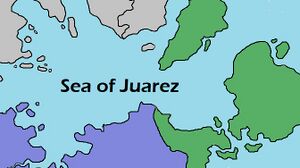Sea of Juarez Maritime Dispute
| Sea of Juarez Maritime Dispute | |||||
|---|---|---|---|---|---|
Sea of Juarez. Inyursta (Green), Cuscatlan (Blue) | |||||
| |||||
| Belligerents | |||||
|
| Ausitoria | ||||
| Commanders and leaders | |||||
|
| N/A | ||||
| Strength | |||||
|
- Indeterminate maritime patrols | N/A | ||||
| Casualties and losses | |||||
|
None | N/A | ||||
The Sea of Juarez Maritime Dispute was a brief incident between La Républica D'Inyursta and Ausitoria. Despite the "non-eventful" nature of the situation, the outcome is considered extremely important for later developments.
Background
Tensions between Inyursta and Ausitoria were raised during the Tarkan-Whiteshore War, in which both nations supported opposite sides and sparked a large debate in the IFC over potential alliance involvement in the conflict. Ausitoria's illegal unilateral expulsion of Inyursta from the IFC also added to the tension.
Inyursta and neighboring create the Juarez-Martinez Shipping Route (abbreviated JMSR); a joint-national authority to police, upkeep and collect dues for the sea lane and the Martinez Canal. The JMSR was set so that ships (save special allied vessels) entering through either the Sea of Juarez in the east or the outlet of the Martinez Canal would only have to pay one set of dues upon entrance, rather than one set entering the canal and another set entering the Sea of Juarez. This made policing and collecting dues easier as each nation only had to worry about collecting from ships coming from one direct. The development of this trade route enraged proponents of "freedom of navigation", including the Ausitorian regime.
The Dispute
Things reached a boiling point when another argument over maritime customs and right to passage came up. The Ausitorian regime then claimed they had a right to navigate whichever body of water they choose - including the Sea of Juarez which is widely considered to be Inyurstan internal and territorial waters - based on a select set of maritime conventions. Inyursta conversely claimed that they are signatory to no such maritime convention, and therefore not required to open their green-water territories to a nation they see as hostile.
The government of Inyursta subsequently closed the Sea of Juarez to ships bearing the Ausitorian flag or transporting goods to Ausitoria, while the Ausitoria regime claimed they would respond and ensure that a quote "vital sea lane" would remain open. In preparation for a looming conflict, the Inyurstan Navy, including by proxy the Inyurstan Coast Guard, then stepped up maritime patrols ready to respond to the threats by the foreign power. Sea traffic was monitored through both ground-based and airborne radar sources, and forces in the vacinity of the Sea of Juarez were placed on high alert in preparations to open or challenge Inyurstan control of the Sea of Juarez.
Climax
In spite of the build-up, the Ausitorian regime functionally backed-out and failed to live up to their threats or enforce their claims. The Inyurstan Navy was able to hold and secure absolute control of the entrance to the Sea of Juarez without firing a shot.
A single freighter registered to a foreign trade partner of Ausitoria was sent to challenge the sea claim via means of offset trade, but it was turned around under threat of being sunk before pushing too deep into the Sea of Juarez.
Inyursta, a medium-sized developing nation, had openly challenged and disregarded the claims of a much larger and self-proclaimed more powerful nation without consequence or repercussion.
Results
In the wake of the incident, the following results were solidified:
- Complete de-facto and de-jure Inyurstan military, political and economic control of the Sea of Juarez
- Sea of Juarez entranced recognized by all local governments (except North Guerroca, who stayed neutral and took no part in the conflict) as rightful Inyurstan waters.
- JMSR operations continued unchallenged
- Zero Ausitorian vessels entering the Sea of Juarez since 2017
Later Developments
Inyursta, under the new leadership of of Président Jean-Baptiste Calderone, soon after drafted the COSTAL Accords which were based largely on their perceived victory in the Sea of Juarez; as well as the general belief that modern area-denial capabilities inherently nullify and render certain international boundaries obsolete.
Inyursta was later allowed back into the IFC, under new leadership. Ausitoria's unilateral actions to eject Inyursta from the IFC were condemned as illegal and an abuse of power.
Debate of Results
While most nations aware of the event subscribe to the view that the situation was an overall victory and positive outcome for Inyursta and its allies; Ausitoria and its allies claim that it was actually a victory for them and a loss for Inyursta. Such critics refer to the situation as "The International Arbitration"; despite the fact it was neither an arbitration nor was Inyursta or any of its private citizens made to pay any amount or form of compensation. Such critics also claim that offset trading routes and continuing to exhaust diplomatic efforts means the conflict is neither resolved nor set in stone.
Meanwhile, the Inyurstan government has refused all diplomatic avenues and expressed its intent to continue this policy unless otherwise forced to resort to diplomacy. Military and geopolitical experts are also immensely sceptial of the claim that alternative trading routes somehow nullify or compensate for failure to open up a vital sea lane. Additionally, it is widely speculated that the money "won" by such an "arbitration" actually originated from Ausitorian sources; meaning that - if true - they had payed themselves with their own money.
